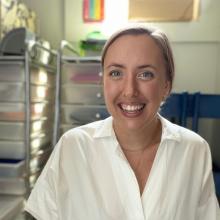3 Questions for Special Education Teachers to Ask Themselves This Summer
It’s the middle of summer, and that means it’s a great time for teachers to relax and recharge a bit before the next school year. At the same time, however, it is also an important opportunity for us to do a few minutes of self-reflection on the past year in the hopes of making the upcoming school year the best one yet.
It’s so easy to make it to the finish line of school and then totally turn your teacher brain off; but, taking just 10-15 minutes to reflect on the prior year before beginning a new one can pay huge dividends in the future success of your classroom.
During the school year, we often get bogged down in solving problems as they arise, and it can be difficult to think through larger visions and themes in our rooms. However, summer offers us an amazing chance to reflect on the big picture, think about what we want our classrooms to look like, and decide which changes we need to make to get our students to that place.
Here are some guiding questions you can use to help get you started. I would encourage you to take 10-15 minutes in a quiet place to think through these — jotting down your answers if you can!
1. What is my vision for my students?
Think about your overall vision for your students and let it drive everything you do. What is it that you MOST want for your students to be able to accomplish when they leave your classroom? What about in 5 years? What about 15?
A clear vision is a powerful motivator you can come back to when things get tough during the year. Do you imagine your students having the ability to communicate their thoughts and feelings with those around them? Do you picture students who are able to self-regulate their emotions and safely navigate all things life throws at them? Do you see future employees, doing meaningful work with coworkers that love and support them?
Cast a BIG vision into the future, then work backwards and think about the small steps that need to happen this year in your classroom to help that vision become a reality. Then, when you are setting mini-goals for your room, you can make sure they align with this vision. Having a strong vision and communicating it clearly to parents, administrators, and classroom staff is also a great way to build buy-in and begin the year on a positive and empowering note!
2. What do I want to learn, and what is my plan for learning it?
This question isn’t about your students, but rather about YOU. As teachers, we always need to be growing and learning. And as special education teachers, our scope is so wide, there will always be things we aren’t experts in (yet!).
Think about a topic you want to learn more about (ideally, this will be related to a need in your classroom you want to better serve). It could be anything from AAC usage to math instruction to teaching social and emotional skills. Pick an area you feel particularly weak in and start looking into the trainings and resources available to help you learn. There is so much online and a lot of it is free, so you can start diving in this summer if you have time.
My favorite places to start looking are within the CEC website itself or in IRIS Modules from Vanderbilt’s website. And if you end up finding an amazing school-year training, go ahead and send an email to your admin asking for their support with financial assistance or time off for professional development.
3. What is one thing I want to start doing, and one thing I want to stop doing?
It can be overwhelming to think of a classroom improvement plan from scratch, so use your special education teacher knowledge to break it down into small steps! I’ve found that picking ONE thing to start and stop at a time greatly increases my chances of implementing it and following through. I can then revisit the question or idea every quarter or semester so that by the end of the year, I’ve been able to drive lots of meaningful change in my room.
Maybe you want to start a morning meeting, an inclusive lunch bunch, or a set paraprofessional team meeting on a weekly basis. This can be ANYTHING – the key here is to pick something and just start!
Although it can be more difficult, I also think it’s equally important to identify one thing to stop doing. What is one thing that isn’t working super well in your classroom or is not helping your students gain independence? Pick a specific classroom routine, time of day, or practice to abandon and try something new.
Using a “stop one, start one” mentality is a wonderful way to focus in on classroom goals and make necessary changes without interrupting the flow of teaching or piling on to all the other items on your to-do list.
So, there you have it – three questions I would encourage you to stop and think about for the upcoming school year. Share your answers to one or all of the questions in the comments below and let’s encourage each other as we prepare for a new school year full of growth and learning for ALL students!
